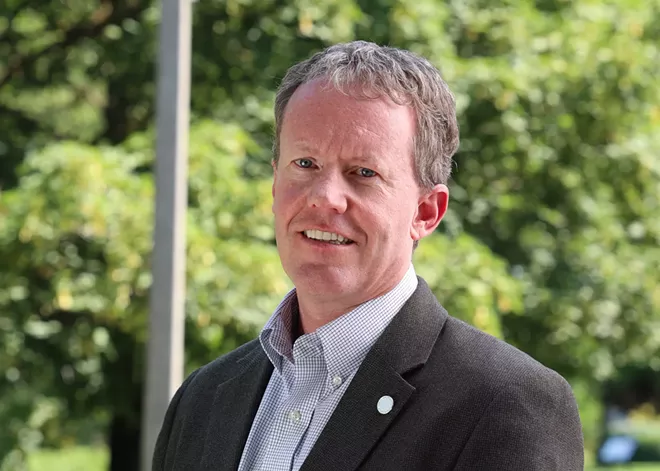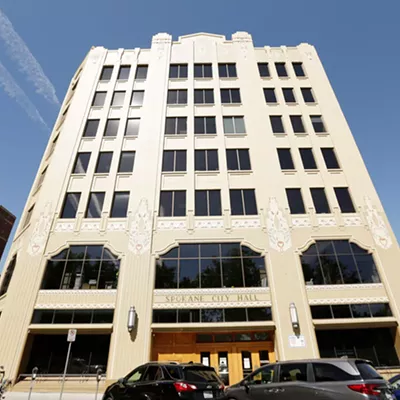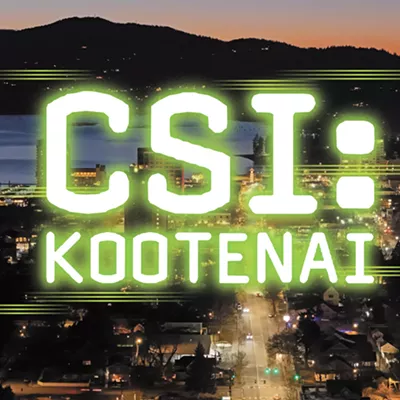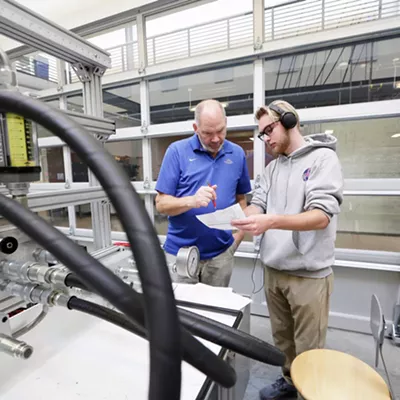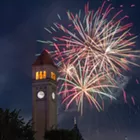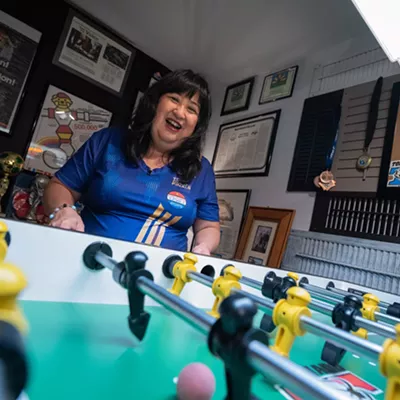The future has never been certain for former Spokane Community College President Kevin Brockbank. Before working in higher education, he thought he would be a high school business teacher, and before moving into college administration he considered buying a whitewater rafting company.
Now, after nearly 30 years in education, Brockbank's future is crystal clear: Instead of riding the waves of a turbulent tributary or teaching troublesome teens, he's decided to help guide thousands of students traversing higher education in Eastern Washington.
In May, Brockbank was promoted to chancellor of the Community Colleges of Spokane, where he'll preside over both SCC and Spokane Falls Community College.
For the first half of his career, the rural Montanan spent school years working as a tenured computer and office technologies teacher at Helena College — and summers as a rafting guide in Glacier National Park.
While he had no plans to leave his home state, Brockbank's renewed interest in college administration took him to Salt Lake City, where he was dean of the School of Applied Technologies and Professional Development at Salt Lake Community College. Afterward, he made his way to Spokane, where he's worked since 2015.
The Inlander sat down with Brockbank to discuss his new position, how the north-south freeway has impacted SCC and whether there's a new mascot in the future. Brockbank's answers have been edited for clarity and length.
INLANDER: What was the transition from teaching to administration like for you?
BROCKBANK: I loved teaching and still love teaching. One of my concerns about taking this job as the chancellor was simply the fact that I'm moving further away from the teaching and learning environment. But, the reality is that in education, if you're a great manager and leader and administrator, you're teaching all the time. I am in a different kind of classroom every day. I absolutely miss the traditional classrooms, students, but my day is filled with teaching and learning in a different way.
What exactly is a chancellor?
You might liken it to the K-12 model with a superintendent and principals. Each of our two colleges has a president, and I preside over them both as the chancellor.
So what's the difference between a chancellor and president?
The president of the colleges probably spends 90 percent of their time on what's going on today, like personnel issues, design issues, parking and whatever else. Then 10 percent of their time should be spent visioning and looking forward. The chancellor should be spending the reverse, with about 90 percent of the time spent on visioning and planning for the year.
What brought you to Spokane?
I ended up being a finalist for the SCC president position, but was beat out. Then the chancellor at the time, Christine Johnson, offered me a different job as a vice provost. After a couple years I actually had the opportunity to be the acting president, and then later I became the permanent president.
How does it feel to fill in Johnson's shoes after her retirement?
I will always be grateful for the fact that she left CCS as a really solid organization with a good history and a good success level, and has given us a platform to take on challenges of the future. Christine and I are absolutely different people and different leaders, but working with her was great. It was a delight, and I have a ton of appreciation for her.
Where is the best place on campus to hang out?
The best place at both campuses to hang out are the student centers. They're both designed a little bit differently, but if you work in education and truly have any sense of students and student success, going into those student centers is where you get filled up. As a president, when I would have a bad day, the solution to that was to take an hour and walk around campus and almost every single time that fixed it. Those are the best places all year long.
Have you taken any classes at CCS?
Actually I've taken like an Inland Northwest culinary class. You go in there one night and you cook food from a different region with one of our chefs. We're not holding those right now, but it used to be really popular. So yeah, I've done a couple fun things like that.
Are there any classes that you would want to take?
Ha. This schedule is so unpredictable and I don't have a lot of personal time, so probably not.
What are some projects we can expect to see from CCS in the next year?
One of them is our Guided Pathways project, which continually takes an internal look at unintended barriers for student success. Why does this group of students not succeed at the same level as this group of students? And if so, what's happening there, and what are we doing to cause that? Are we not providing the right kind of learning support? I think we also have a real imperative to significantly redesign and up our efforts in providing workforce education and service to our employers in the community.
We'll also be doing a major rebranding campaign. That's really an intrusive look into who the community thinks we are, who we think we are, what value we provide and then how we communicate that effectively. And of course the logo; we are the only college in the country with Bigfoot as a mascot.
I assume the mascot's not going to change?
Not on my watch.
How has the North Spokane Corridor construction affected SCC?
If we could take one silver lining out of the pandemic, it would be that it happened at the same time we were building the North Spokane Corridor. The real massive impact of that would be the loss of a whole bunch of parking spaces, like you're talking 900 or more spaces. But right about the same time they started digging holes, the pandemic happened. The transfer of students online or into hybrid schedules decreased the amount of concentrated traffic on campus and made it a nonissue. When they finish that up, it'll coincide with a time where it is going to be dramatically necessary for us to have that parking back.
It also changes the front door at SCC, so there will be more capital projects, which I think will ultimately make that college more welcoming and more navigable because we'll locate all of our services up front.
It had the impact or had the potential to be like a real detriment for operations, but we got the lucky roll of the dice.
How do you think the new City Line is going to affect students?
You know, it'll be interesting to see. Our students pay for a bus pass each year, so we can get ridership numbers from that. It will dramatically increases the amount of bus traffic on campus. I think it's a great convenience for a lot of students. You know, transportation sometimes becomes a major issue for students who have financial troubles too. Maybe it's not a problem for you now, but if your car does break down in January you'll have the central city line as an option. It's nothing but a benefit for our students.
Have you taken the bus yet?
I did because I was on the steering committee, so I got to ride it like six months ago. It's a different kind of bus than I've ever been on. More loungy.
Is this the last stop for you, metaphorically speaking?
This is absolutely the last stop for me.
What impacts do you hope to leave behind?
I want to be able to walk away and know for a fact that this is a better place for students to attend college. It's a better resource for students to build careers. It's a better place for people who are our employees to work. And it's a better resource for our employers in town that helps build our economic development. ♦

